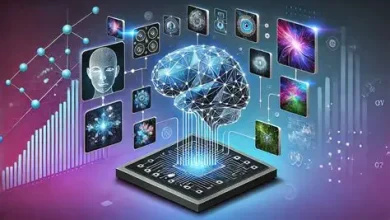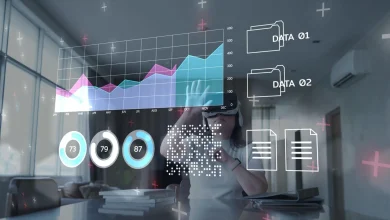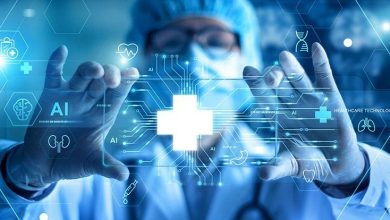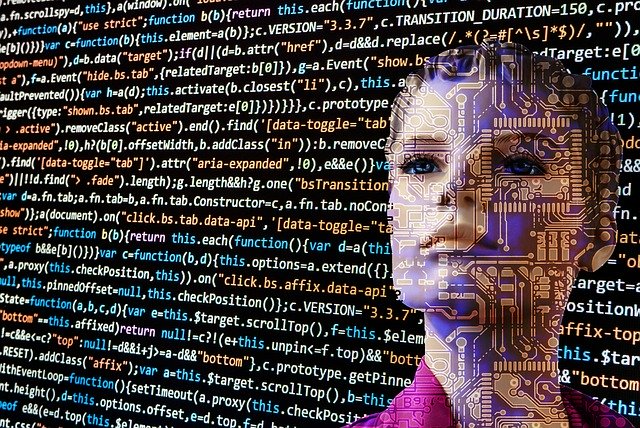
It’s not a new topic to be discussed as I’m sure you’ve heard the argument now about whether AI can replace humans and their jobs, or worse, replace human control of the planet like The Terminator film series.
In a hurry? Here are the key points
1. Can AI replace humans?
2. AI can’t creatively think
3. AI increases our efficiency
4. AI creates new industries
5. AI is helping us live longer
6. What’s your opinion?
Can AI replace humans?
There are a few questions we will attempt to answer in this post and try and uncover the answer to the question, whether they will or not, can AI replace humans?
The short answer is yes, AI can replace humans.
We’ve seen robots replace human jobs and a robot has some form of AI in it to ensure it functions and knows what job it’s doing.
This isn’t new and is a trend that is growing as businesses invest more money into this rapidly advancing area.
Will AI permanently replace all humans and create a machine-driven apocalypse? We can’t predict the future (if you can, please get in touch) but it’s not currently looking likely. So the answer, for now, is no.
The use of AI alongside other technology and product/service advancements we’re making so far has allowed us to automate monotonous and administrative tasks in business and personal circumstances.
It’s given us customer experiences never before possible, reduced costs, and given us better security, just to name a few.
When you look at the major advancements we’ve made in the world, it’s quite interesting to see that all of them have developed us as people and created more jobs than ever before, not the reverse.
When it comes to the topic of AI, why do we think we’re going to suddenly be out of a job or out of a planet to live on?
Let’s have a look together to see what AI can and can’t do to see if this can give us insight into whether they could replace humans altogether.
AI can’t creatively think
Everything AI currently does with its counterparts (robots, internet, chatbots) is programmed into the machine, meaning it can’t think for itself outside of the code it’s got or have a conscious.
This is a real limit to what AI can do as it can’t deviate from set instructions or create a plan of its own, i.e. be creative.
Now you might be reading this and thinking “but machine learning is creative as it can show you the best way of optimising a system or doing a task”.
That’s because AI technology is derivative. It can’t think of a situation itself; you must give it something pre-programmed.
It’s important to note though, as the speaker in the TED video above mentions, it doesn’t mean the technology can’t learn to be creative in the future.
Imagine giving an AI capable of machine learning a blank piece of paper a pen and paper and asking it to draw something. It wouldn’t know what to draw or write and produce nothing.
However, give it a drawing of what you would like it to copy, it would be able to do it and likely in better detail due to precise movement.
That’s when machine learning comes in and it can learn how to make it even better by looking at similarities of other relevant pieces.
Putting a human in front of an AI and asking to read what a human is thinking via body language or speech-language it wouldn’t be able to do it.
Humans have proven to be able to do it naturally through emotional intelligence.
AI doesn’t have emotions…. for now.
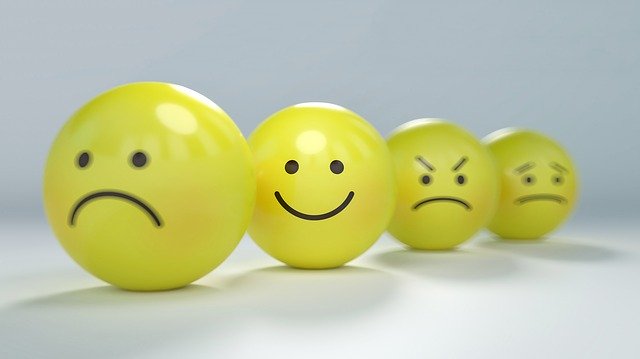
AI has given us more time to be creative as we don’t need to spend as much time researching or searching for something on the web for example.
And we don’t just mean for drawing.
More creative with business strategy, creative with presents for an occasion, creative with fashion, and what we might like, creative with our marketing strategies, the list is ongoing.
AI increases our efficiency
Have you noticed how the amount of repetitive work within the workplace has decreased over time?
You can have all your accounts automated, leads added to a Customer Relationship Manager (CRM) with all data fields filled, filter resumes to find ones that match the criteria, automated bank payments, shows us data that we might find helpful, recommending places to eat off our previous purchases, you get the idea.
An example of this is that AI can analyse a sales call faster than anyone on earth with it taking an estimated nine years of nonstop sales call analysis for a human to compete according to a report by thinkgrowth.org.
Because AI can add intelligence to existing products or services it allows for better customer experience and betters the use we can get out of that product.
Think about Apple iPhones when they introduced Siri to their upgraded models, something that now comes as a standard.
When you’re buying from a business’s website or email, it’s common for them to recommend products you might like and this improves the efficiency in which we shop and how quickly we can become a customer.
Not that it improves our efficiency that much, but would you say it improves the efficiency of the business in terms of selling products and increasing revenue?
As it stands I don’t think we will see AI trying to decrease our efficiency as that’s the whole reason machine learning exists and what AI seeks to improve through algorithms.
In cybersecurity, there will be AI applications or malware created and purposefully put into systems to show how it’s not efficient and where weak spots are.
What’s the result?
Of course, it shows us, humans, where the pressure points are and what needs to be improved.
A kind of win-win situation for us.
Can AI replace humans in new industries?
And as such creates new businesses, job roles, and career opportunities.
Ask anyone who was working 15 years ago if they’d heard of a job role titled ‘social media marketing manager’, chances are they would skip right over if they heard of a job, but ask what social media even was or what it stood for.
If you told someone there would be a company off the back of social media called ‘Facebook’ with annual revenues over $50bn, they would have likely labeled you insane.
However, in more recent days, these are some of the biggest companies the world has ever seen. With AI partly, or mainly, responsible for the quick and explosive growth.
CNBC reports that by 2020, artificial intelligence will generate 2.3 million jobs, exceeding the 1.8 million jobs that it will wipe out.
Forbes suggests that by 2022 AI will create more than 58 million new jobs.
Now if we were to take two reports and compare their predictions, 2.3 million jobs to 58 million within a two year period, it’s hard to see how AI is going to replace people permanently anytime soon.
Now you’ve got to consider the implications for employment…
Are there even enough people skilled in the industry and all the new jobs that are coming as a result of the advances?
Think of the cost to companies to upskill current employees and what will have to happen to the education system, as a result, to get people qualified for these careers once they come out of school and university.
Some commentators and industry experts say we’re only on the tip of the iceberg.
With so many companies and industries emerging just from what we’ve currently got, it will be amazing to see what new businesses, industries, and career opportunities will have revealed themselves 10, 15, 20 years from now.
There’s even a dedicated website called ‘Will Robots Take My Job’ as this is such a growing topic of conversation where they look at various different arguments for and against. We recommend you check it out if this is a topic that interests you.
AI is helping us live longer
You might have seen in recent news about how AI can now detect cancer and is more reliable than a doctor or human at detecting the disease.
And Google’s artificial intelligence system could be better at spotting breast cancer than expert radiologists. Other reports say it IS better at spotting cancer than doctors.
How’s that for improving efficiency?
Of course, this is a great step forward. The best thing is that this is not the only area within healthcare AI technology is being applied.
Think about it, it can reduce the number of times you need to go to your local doctor or hospital, it eliminates the risk of human error so you have increased certainty, it can figure out where cancer is located, and at what stage, and, over time, will be able to pick it up even quicker in new patients thanks to machine learning.
While it’s great that AI can help identify problems or trends such as the case with cancer, fortunately, or not so fortunately, AI can’t provide cures as such, we still need to make the vaccines and test on humans to ensure the cure works.
Using the healthcare industry as the example above, I’m not saying AI won’t be able to find a cure for diseases or infections, I just can’t see it wiping out the need for humans anytime soon.
As mentioned earlier, AI doesn’t have any creativity that is a fundamental part of human genius that allowed us to create the technology in the first place.
Then you have to consider that as the technology identifies new areas for thought in all industries, not just healthcare, the need for more human research opens and more positions become available to evaluate that data, act on that data, lead a new development team, etc.
If you look at the recent news about the NHS, for whatever reason, they’re not planning to slow down on the number of people they hire for the hospitals across the U.K. and are only planning on getting more people qualified and into a career with them.
AI will likely lead to rapid improvement and development by being able to do simulations of mixed components, coming up with bioengineering hacks, and quicker ways to see if a drug is effective or not, which is all exciting and promising for prolonging human life.
What’s your opinion?
Do you think AI will take out the need for humans in industries? Perhaps you think there could be industries that are run by robots and AI? Let us know in the comments!
Be sure to leave a comment, like, and subscribe to make sure you’re the first to know when we’ve released new content. Until next time.

